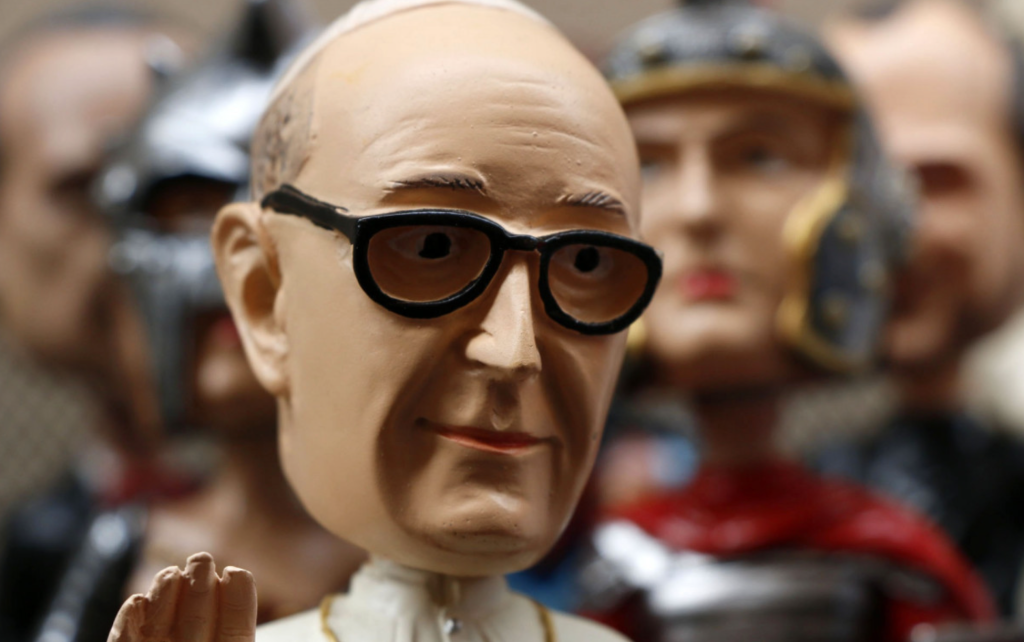

Renewal begins with the parish—not the pope
The media loves anniversaries. They provide a ready-made pretext for a story. Last year marked the sixtieth anniversary of the opening of the Second Vatican Council; a flurry of articles and books ensued. This year marks the tenth anniversary of the papal reign of Pope Francis. A similar flurry has followed—similar to last year’s reflection on Vatican II not simply in quantity but in tone.
For his admirers, particularly those at the left-liberal end of the Catholic spectrum, Francis represents a return to the true “spirit of Vatican II” suppressed by the reactionary pontificates of St. John Paul II and Pope Benedict XVI. For his detractors, mostly found at the conservative end of the Catholic spectrum, Francis represents a return to the bad old days of Vatican II liberalism, which dominated the Catholic landscape from the end of the Council in 1965 to the election of John Paul II in 1978. In this sense, Francis stands at the center of the Catholic culture wars. These wars within the Church bear a disturbing similarity to the culture wars outside the Church.
The competing assessments of Francis each, in their own way, deny that they are simply stalking horses for the secular culture wars. Paul Baumann, former editor and senior writer of the liberal-leaning Catholic journal Commonweal, judges that Francis has “emphatically turned away from the culture wars.” Marco Politi, a veteran Vatican journalist and biographer of Francis, puts a finer point on this interpretation: “He has wiped off the table all the obsession of the Catholic Church about sexual issues.” From the world of academic Catholic liberalism, the Villanova theologian Massimo Faggioli sees Francis in terms of an even broader shift away from “a certain bourgeois Catholicism” dominant within “the North Atlantic.” Liberals celebrate the Argentinian Francis as the first Third World pope. Sean Michael Winters, a columnist for the liberal National Catholic Reporter, credits Francis’s Latin American roots for his unique ability to stand “among the poor” against the domination of “modern consumer capitalism.”
There is something annoyingly disingenuous about all this crowing. In saying that Francis has moved beyond the culture wars, these commentators are really saying that Francis has taken their side. On sexual matters, Politi notes: “He doesn’t change the letter of some Church documents. . . . But with his gestures or with his words, he paves the way to new attitudes.” Before Francis, liberals never really had a pope they could call their own. The heyday of liberal Catholicism came under St. Pope Paul VI, who presided over the later sessions of Vatican II but will forever be remembered by liberals as the author of Humanae Vitae, the encyclical reaffirming the Church’s traditional prohibition on artificial birth control.
Any “obsession” with sex reflected in the debate over Humanae Vitae came not from Pope Paul but from his liberal critics. Even as he affirmed traditional Church teaching, Paul called for a deeper appreciation for and cultivation of the emotional bonds between husband and wife within marriage. Not good enough for Catholic liberals! Contraception was a non-negotiable, one that tore the seamless garment of Catholic social teaching, making concern for the poor a “liberal” issue and fidelity to Church teaching on sexual matters a “conservative” one. There is perhaps no clearer instance of “bourgeois Catholicism” than the willingness to sacrifice the unity of the tradition for the principle of contraceptive sex.
That being said, conservative Catholics in America share the same bourgeois obsession with sex. Though more willing to assume the mantle of “culture warrior,” conservatives claim the principled high ground for their opposition to Francis, insisting they intend only to defend the doctrines of the Church against a pope who has abdicated his responsibility to provide clear guidance to the faithful. This self-righteous self-image collapses even under casual scrutiny. As liberal Catholics moved from support for contraception to support for abortion, conservative Catholics could claim opposition to abortion as the absolute litmus test for Catholic orthodoxy. Still, conservative Catholics seeking a public presence beyond a very small slice of the Pro-Life movement remain as silent on contraception as a 1970s-era liberal bishop. Further, conservative Catholics have largely jettisoned the authoritative social teaching of the Church, or spun it beyond recognition to conform to the free-market orthodoxy of the Republican Party. Conservatives are correct to see Francis as the enemy of this sort of cafeteria Catholicism, particularly when advocated by the talking heads of El Norte.
The conservative hostility to Francis reflects more than frustration at his seeming nonchalance with respect to the Church’s sexual teaching. For American conservatives in particular, Francis’s pontificate has seemed like a betrayal. For roughly thirty-five years, during the pontificates of John Paul II and Benedict XVI, conservative American Catholics, with the assistance of conservative spinmeisters, could see the papacy as something like their personal possession. The papacy stood for anticommunism and sexual orthodoxy—no matter that both John Paul and Benedict continued to teach the fullness of the tradition, including all of those teachings judged “liberal” by conservatives.
Nothing other than this visceral sense of betrayal explains conservative columnist Ross Douthat’s relentless war on Francis. Five years into Francis’s pontificate, Douthat published a scathing critique of his papacy, ominously titled, To Change the Church (2018). In the same spirit, he recently acknowledged the ten-year mark of Francis’s papacy with a New York Times op-ed titled “Pope Francis’s Decade of Division.” According to Douthat, Francis would seem to be responsible for clerical sex abuse, the decline in vocations, the degradation of the liturgy, and the whole range of modernist heresies identifiable to conservative Catholics as the bogeyman of “German bishops.”
The problems Douthat identifies are real, but they existed long before Francis’s papacy. The framework of “division” speaks more to the sense of alienation felt by conservative columnists who for so long felt a special relationship to the papacy. Poor Ross, born too late! The Church was no less divided under John Paul and Benedict, only it was liberals who felt alienated from the papacy then. Liberal alienation was softened somewhat by the inertia of liberalism at the parish level, an inertia that benefited from the benign neglect of conservatives content to hunker down in enclaves and bask in the glow of perceived papal favor. John Paul and Benedict provided needed theological clarification and guidance in their writings, but their pontificates did little to change the secular drift of Catholic life in the developed world. Francis has indeed loosened some of the theological reigns tightened by his predecessors, but his actions have only revealed the inadequacy of the earlier tactic of suppression.
I generally admire Francis and take more delight than I should in his ability to anger American conservatives. And re-reading Benedict’s Jesus of Nazareth this Lent has reminded me of the virtues of a very different kind of papal charism. Still, the whole phenomenon of the Francis wars has impressed upon me the limits of the high papalism that has characterized so much of Church life since the pontificate of Pius IX (r. 1846-78). The papacy is essential to Church unity at all times and strong papal leadership is necessary at some times. But those longing for renewal in the Church should focus on the faith as lived in parish life rather than seeking salvation in the next papal election.
Christopher Shannon is associate professor of history at Christendom College in Front Royal, Virginia. He is the author of several works on U.S. cultural history and American Catholic history, including American Pilgrimage: A Historical Journey Through Catholic Life in a New World (2022), available now from Ignatius Press.